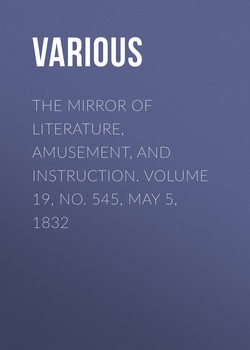Читать книгу The Mirror of Literature, Amusement, and Instruction. Volume 19, No. 545, May 5, 1832 - Various - Страница 6
THE COSMOPOLITE
ОглавлениеTHE POETRY OF ANCIENT DAYS
(For the Mirror.)
Little Jack Horner, sat in a corner,
Eating a Christmas pie,
He pulled out a plum with his finger and thumb,
And said what a good boy am I.
Of all the poems that delight our infancy, there is no one perhaps which makes a more lasting impression on the memory and the imagination, than the preceding. The name of its author is lost in the shades of remote antiquity; and even the century when it first made its appearance, has eluded the vigilance of antiquarian research. Before entering upon its poetical merits, we must observe a striking peculiarity in the diction: there is not a single word in it, but that is of Anglo-Saxon origin, so that it may be considered as an admirable specimen of pure English, and as calculated to inspire the infant mind with a distaste for the numerous exotic terms, which, in the present age, disfigure our language. It has been well remarked in the review of that ancient poem, Jack and Jill, that the reader's interest in the hero and heroine is not divided with subordinate characters. But the poem of Jack Horner possesses this excellence in a more eminent degree; in the former the interest, is divided between two, in the latter it is concentrated in one; and, notwithstanding the ingenuity of the reviewer, it must be confessed that so little is indicated by the poet, as to the character of Jack and Jill, that we feel no more interest in their fate, tragical as it is, than if they were designated by the letters X and Y of algebraical notoriety; or by the names of those personages, who figure in legal fictions, John Doe and Richard Roe.
Not so with Jack Horner: the very incident recorded in the first line lets us into his character; he is evidently a lover of solitude and of solitary contemplation. He is not, however, a gloomy ascetic; he takes into his corner a Christmas pie, and, while he leisurely gratifies his palate, his mind feasts on the higher luxury of an approving conscience. It has been said that the man who loves solitude must be either an angel or a demon. Horner had more of the former in his composition; he retired from the busy haunts of his playmates not to meditate mischief, but to feast upon the pie, which had probably been given him as a reward for his good conduct, and indulge in the delightful thoughts to which the consciousness of deserving it gave rise. But here it may be objected, why instead of eating his pie in a corner, did he not share it with his companions? The remark is pertinent, but the circumstance only evinces the admirable management of the poet; to represent his hero without a defect would be to outrage nature, and to render imitation hopeless. Horner, it must be admitted, with all his excellence, was too fond of good eating; it is in vain to deny it; his deliberately pulling out a plum with his finger and thumb, shows the epicure, not excited by the voracity of hunger, but evidently aiming to protract his enjoyment. The exclamation which follows savours of vanity; but when his youth is recollected, this will be deemed a venial error, and it must also be considered that his few faults were probably compensated by a constellation of excellencies. This poem has been imitated, (I will not say successfully, for its beautiful simplicity is in fact inimitable,) by one of the greatest statesmen and classical scholars of the present century, Mr. Canning; and it is melancholy to reflect that, while a monument is erecting to the memory of the latter and his name lives in the mouths of men, all traces of that original poet, whose inspirations he sought to imitate, are entirely lost. The lines of Mr. Canning are to be found in his "Loves of the Triangles:"
Thus youthful Homer rolled the roguish eye.
Culled the dark plum from out the Christmas pie,
And cried in self applause, how good a boy am I.
P.Q.
